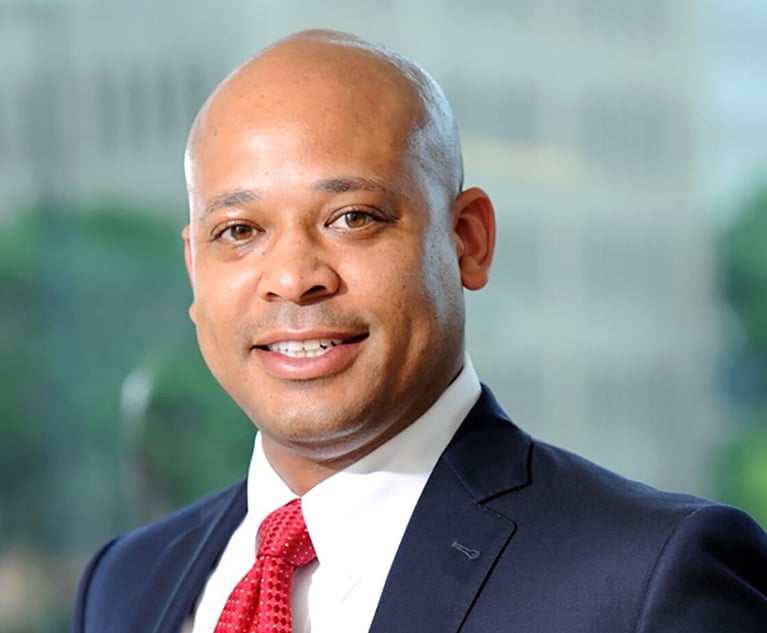 Jake Evans, Holland & Knight, Atlanta (Photo: John Disney/ALM)
Jake Evans, Holland & Knight, Atlanta (Photo: John Disney/ALM)To Win for Your Client, Define 'Win' Together
A client's goal varies immensely on their risk preferences, the matter type, the exposure, the precedential value, the business relationship between the parties, and innumerable other factors.
December 28, 2018 at 11:47 AM
5 minute read
Winning is achieving a desired result. In life and in law, winning is easier said than done. But proactive thinking can maximize the likelihood that we win. This article proposes a systematic process for new representations to assist in winning for clients.
1. Identify the Client's Goal—'Begin With the End in Mind'
The first step in any representation is identifying and defining the client's goal. Without this step, a lawyer will aimlessly take action that may or may not draw them closer to the desired result. Identifying and defining the goal is the most important step of any representation, and it should be taken seriously.
A client's goal varies immensely on their risk preferences, the matter type, the exposure, the precedential value, the business relationship between the parties, and innumerable other factors. To assist a client in defining a representation's goal, an attorney must absorb the circumstances, including the client's business model, potential adverse consequences (both in the legal and public relations context), potential fees to be incurred, and the likelihood of success.
Some clients—depending on the representation—desire to win at all costs (fee sensitivity is not an issue); some client's principal focus is on fee sensitivity, and they want a quick resolution; and some clients are unsure of their desired goal—they just want the problem fixed (this requires attorneys to be most vigilant). Regardless of the scenario, it is the lawyer's job to help the client determine what he or she wants.
To do so, the attorney must accurately apprise the client of all the pertinent considerations. Sometimes, a win in the courtroom could be a loss in the business world. And other times, a loss in the courtroom could be a win in the business world.
It takes a courageous lawyer to lose for the client to win. But this possibility should be considered at the beginning. Otherwise, a lawyer will be myopically focused on winning in court, assuming that this will be a “win” for the client when, in fact, it is just the opposite.
2. Generate a Strategy to Achieve the Defined Goal
Once the goal is defined, it is the attorney's job to achieve it. And to achieve the goal, the attorney must generate a calculated and purposeful strategy, forecasting what could go wrong, because something always does. There are many factors that come into play—opposing counsel's tendencies, changes in facts, media exposure, market fluctuations, the judge/regulator's rulings, etc.
Winners delicately balance these considerations to generate a strategy that is simple yet internalizes the representation's endless possibilities. This often takes significant nonbillable time (e.g., pondering in the shower). But it makes all the difference.
The hardest problems require the most creative solutions. Creative thinking separates good lawyers from great lawyers. I have been blessed to work with many great lawyers. And great lawyers see things other people do not. These unique perspectives come from years of experience, perpetual learning, and purposeful and strenuous analysis of facts and law.
3. Execute the Strategy to Win for Your Client
Once the goal is defined and the strategy is generated, one must execute. Many view this as the most important stage, but (while important) it is not. Most of the work should be already done. You have already weighed the chief considerations in determining the client's goal. You have thought through the legal strengths of your position, and have generated a detailed action plan in the strategy stage. Executing, though, takes discipline, confidence, and hard work.
Attorneys should be disciplined in honoring the strategy. Although flexibility should be allowed for unforeseen events (note, there should be few unforeseen events if you have properly completed the strategy stage), one should stick to the strategy as much as possible.
Abandoning a carefully considered strategy is a recipe for disaster. All your moves have positioned you for a particular course, and dropping it halfway through abandons your position and potentially sacrifices the client's defined goal. Attorneys should also be disciplined in not succumbing to petty distractions. Maintaining focus on the goal will show the best course of action in almost all situations.
Attorneys must be confident in executing the strategy. Be confident you have properly generated the right strategy. Be confident in your ability to execute the strategy. And be confident you will achieve the client's goal. Effective communication is not always about what you say, but how you say it.
Attorneys must work hard to execute the strategy. The most true professional lesson I have learned is that there is no substitute for hard work. Executing a chosen strategy at a high-level takes hard work, and countless hours of preparation. Period.
In my years of law practice, I have been mentored by many great lawyers, and I have examined what makes them great. Great lawyers almost universally apply the framework above. This framework has helped me achieve many great client successes, and I wanted to share it.
As five-time NBA champion head coach Pat Riley said, “Excellence is the gradual result of always striving to do better.” May we all strive to do better for our clients as we enter 2019.
Jake Evans is an associate at the Atlanta office of Holland & Knight. A member of the firm's Public Policy & Regulation and Litigation and Dispute Resolution Groups, he represents individuals and corporate entities in matters involving complex litigation; government relations at the local, state, and national level; and general business law advice and counsel.
This content has been archived. It is available through our partners, LexisNexis® and Bloomberg Law.
To view this content, please continue to their sites.
Not a Lexis Subscriber?
Subscribe Now
Not a Bloomberg Law Subscriber?
Subscribe Now
NOT FOR REPRINT
© 2024 ALM Global, LLC, All Rights Reserved. Request academic re-use from www.copyright.com. All other uses, submit a request to [email protected]. For more information visit Asset & Logo Licensing.
You Might Like
View All
Business Breakups: Why Business and Commercial Cases Are Well-Suited to Mediation
5 minute read

In RE: Hair Relaxer Marketing, Sales Practices and Products Liability Litigation
Trending Stories
- 1Lululemon Faces Legal Fire Over Its DEI Program After Bias Complaints Surface
- 2Plaintiff Gets $500K Policy Limit Without Surgery
- 3Philadelphia Bar Association Executive Director Announces Retirement
- 4SEC Chair Gary Gensler to Resign on Trump's Inauguration Day
- 5How I Made Partner: 'Develop a Practice Area You Really Care About,' Says Jennifer A. Gniady of Stradley Ronon
Who Got The Work
Michael G. Bongiorno, Andrew Scott Dulberg and Elizabeth E. Driscoll from Wilmer Cutler Pickering Hale and Dorr have stepped in to represent Symbotic Inc., an A.I.-enabled technology platform that focuses on increasing supply chain efficiency, and other defendants in a pending shareholder derivative lawsuit. The case, filed Oct. 2 in Massachusetts District Court by the Brown Law Firm on behalf of Stephen Austen, accuses certain officers and directors of misleading investors in regard to Symbotic's potential for margin growth by failing to disclose that the company was not equipped to timely deploy its systems or manage expenses through project delays. The case, assigned to U.S. District Judge Nathaniel M. Gorton, is 1:24-cv-12522, Austen v. Cohen et al.
Who Got The Work
Edmund Polubinski and Marie Killmond of Davis Polk & Wardwell have entered appearances for data platform software development company MongoDB and other defendants in a pending shareholder derivative lawsuit. The action, filed Oct. 7 in New York Southern District Court by the Brown Law Firm, accuses the company's directors and/or officers of falsely expressing confidence in the company’s restructuring of its sales incentive plan and downplaying the severity of decreases in its upfront commitments. The case is 1:24-cv-07594, Roy v. Ittycheria et al.
Who Got The Work
Amy O. Bruchs and Kurt F. Ellison of Michael Best & Friedrich have entered appearances for Epic Systems Corp. in a pending employment discrimination lawsuit. The suit was filed Sept. 7 in Wisconsin Western District Court by Levine Eisberner LLC and Siri & Glimstad on behalf of a project manager who claims that he was wrongfully terminated after applying for a religious exemption to the defendant's COVID-19 vaccine mandate. The case, assigned to U.S. Magistrate Judge Anita Marie Boor, is 3:24-cv-00630, Secker, Nathan v. Epic Systems Corporation.
Who Got The Work
David X. Sullivan, Thomas J. Finn and Gregory A. Hall from McCarter & English have entered appearances for Sunrun Installation Services in a pending civil rights lawsuit. The complaint was filed Sept. 4 in Connecticut District Court by attorney Robert M. Berke on behalf of former employee George Edward Steins, who was arrested and charged with employing an unregistered home improvement salesperson. The complaint alleges that had Sunrun informed the Connecticut Department of Consumer Protection that the plaintiff's employment had ended in 2017 and that he no longer held Sunrun's home improvement contractor license, he would not have been hit with charges, which were dismissed in May 2024. The case, assigned to U.S. District Judge Jeffrey A. Meyer, is 3:24-cv-01423, Steins v. Sunrun, Inc. et al.
Who Got The Work
Greenberg Traurig shareholder Joshua L. Raskin has entered an appearance for boohoo.com UK Ltd. in a pending patent infringement lawsuit. The suit, filed Sept. 3 in Texas Eastern District Court by Rozier Hardt McDonough on behalf of Alto Dynamics, asserts five patents related to an online shopping platform. The case, assigned to U.S. District Judge Rodney Gilstrap, is 2:24-cv-00719, Alto Dynamics, LLC v. boohoo.com UK Limited.
Featured Firms
Law Offices of Gary Martin Hays & Associates, P.C.
(470) 294-1674
Law Offices of Mark E. Salomone
(857) 444-6468
Smith & Hassler
(713) 739-1250







